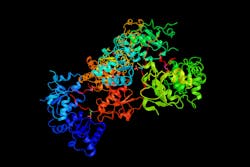As one of the first clinical trials of the drug novobiocin is about to open for patients with cancers carrying BRCA gene mutations, new research at Dana-Farber Cancer Institute shows the drug poses a double threat to tumor cells.
As reported in Nature Communications, the researchers found that in addition to taking aim at the inner workings of BRCA-mutated cells, novobiocin also incites an immune system attack on the cells. The findings suggest that even if novobiocin proves as effective as hoped in clinical trials, it may work significantly better if paired with drugs that magnify the immune response.
Using two tumor models – one of triple-negative breast cancer with BRCA1 mutations, and one of pancreatic cancer with BRCA2 mutations – researchers showed that novobiocin heightens the mayhem already occurring in cell division, with lethal consequences for tumor cells. They found the drug causes tumor cells to become increasingly riddled with micronuclei – miniature nuclei that contain damaged fragments of chromosomes. The chromosome pieces slip easily through gaps in the micronuclei membranes and into the cells' cytoplasm, activating a protein pathway known as cGAS/STING. The pathway causes disease fighting CD8+ T cells to invade the tumors and go into attack mode.

